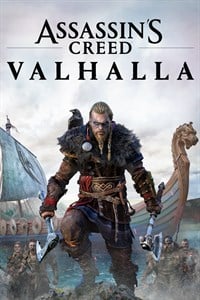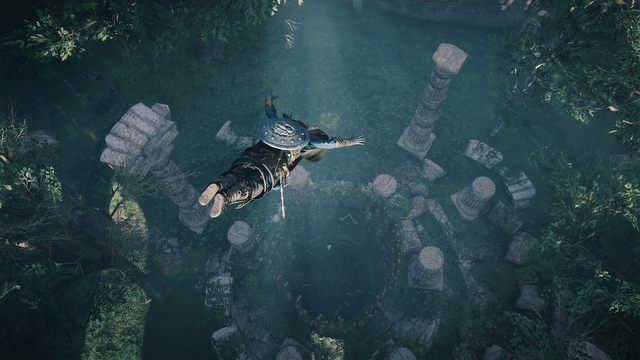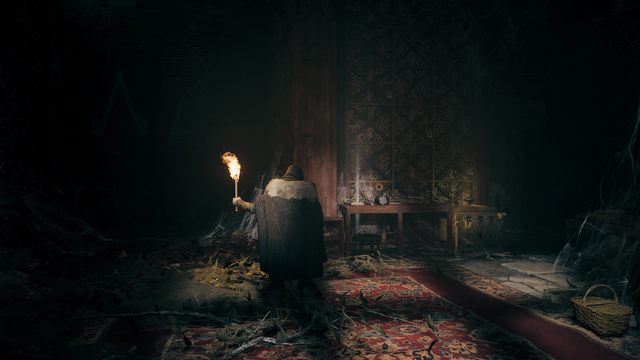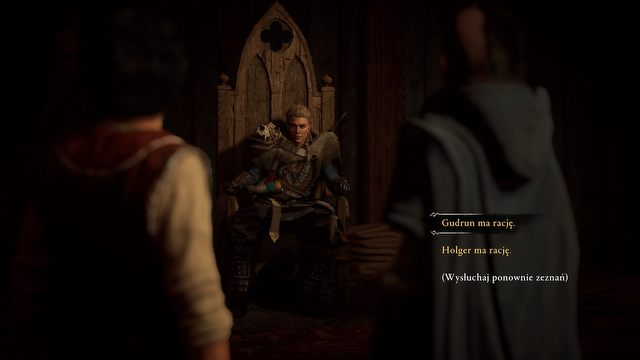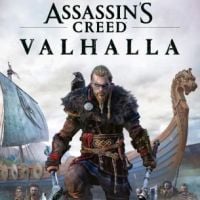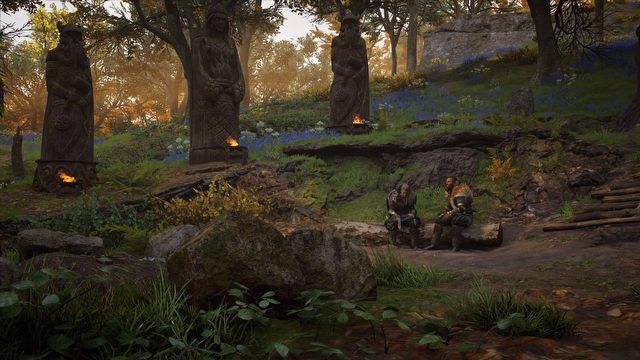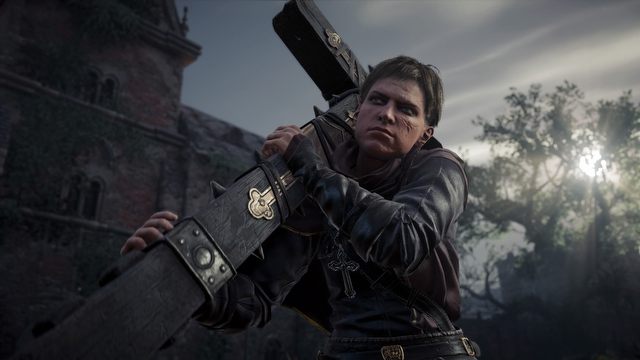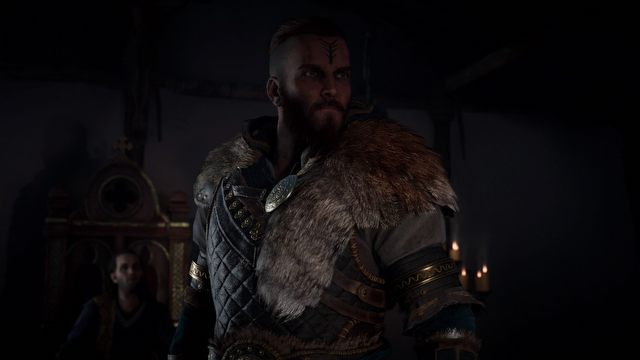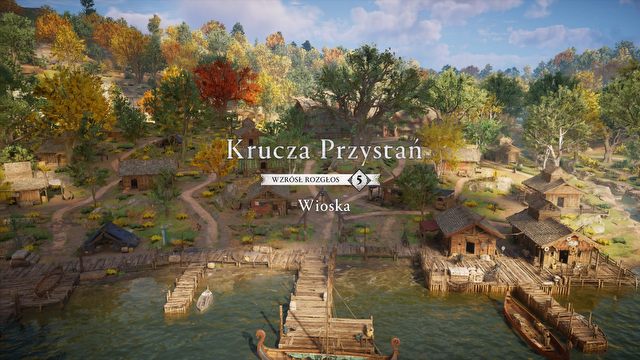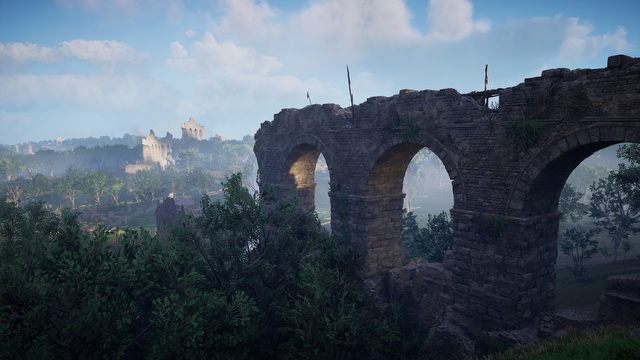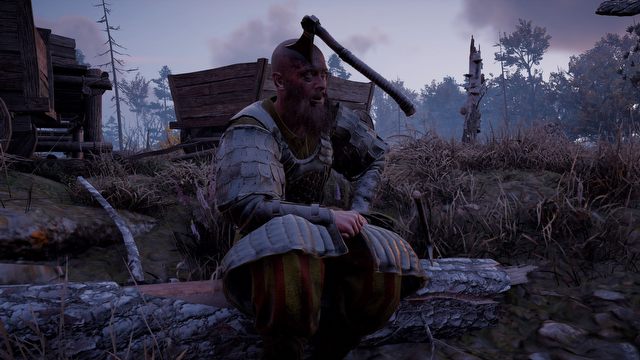Assassin's Creed Valhalla Review - The Assassin We All Wanted
Last week was a hell of a week. I spent it with AC Valhalla, at the side of Eivor, a brave warrior from Norway, who went to England with a bunch of friends to build her house.
The review is based on the PS4 version. It's also relevant to PC, XONE version(s).
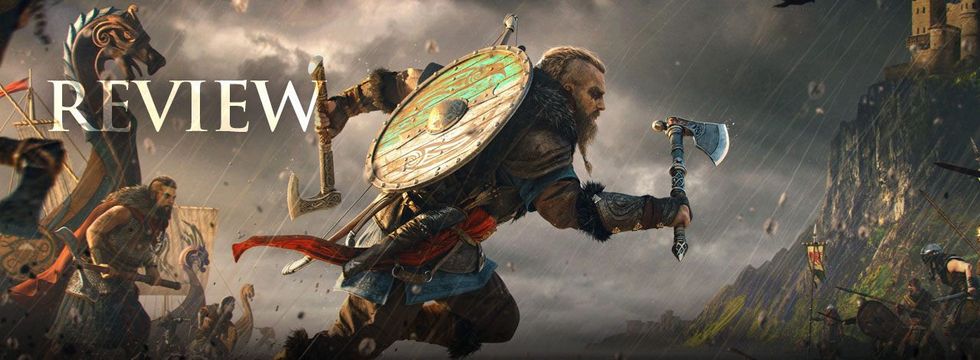
- the best soundtrack in the history of the series;
- phenomenal atmosphere;
- very good story (given the series' baseline);
- packed with content to the brim;
- dialogs are usually solid;
- numerous inserts into the universe, there are genuinely hair-raising moments;
- The Order of the Ancients and everything connected with them;
- huge, diverse world; as many as three regions – one large, and two smaller;
- the village is a pleasant, safe heaven;
- surprisingly, pretty good side activities;
- hidden blade finally works as it should.
- just terribly glitchy;
- unavoidable open fights that ruin stealth playthroughs.
I travelled across Albion, decided the fate of fractionalized kingdoms, overthrew old rulers and installed new ones, climbed the ruins of Roman buildings, saved a dozen villages from destruction, and burned others to the ground, plundered many temples, where clerks locked precious loot in golden chests, hidden from the jealous gaze of the common people. I drank a lot, went to bed with anyone, spent time on more or less fruitful conversations, but most of all – I killed. Not randomly, of course; not the poor people trying to survive in this wild world, but rather those who decided to actively defy my aspirations for success. I killed kings, ealdormans, priests, Anglo-Saxon warriors of all kinds, all armed to the teeth, but also some of my kindred. But now it's time to take a cold shower and try to find a number that best describes my impressions from the game.
Let's start cutting to the chase. Everyone can see the score, but it does require an extensive commentary, because otherwise, it's going to be misleading. Because you see, Valhalla actually deserves more – maybe as much as 9.5, but there are some pretty significant issues that keep me from glorifying it too much. Surprised? I was, too, because on the one hand, Ubisoft delivered a game that seems damn well thought-out and arranged, and which, on the other, is so technically unpolished that it's almost a miracle that it can be completed.
HOW IT SOUNDS
Jesper Kyd is a recognized and appreciated composer, and I always liked his output in the series. Now, this may be an unpopular opinion, but I think that the best soundtrack in the entire series was composed for Origins. I immediately became a fan of Ms. Schachner's style and I am very glad that it was she who, in collaboration with Kyd, by the way, composed the OST to Valhalla. Einar Selvik from the band Wardruna also participated, composing some of the music heard during exploration, and singing in quite a few other pieces, displaying his amazing vocal abilities, and even appeared in the game as Bragi. The result are absolutely dazzling. It was the first game in the series that made me stop sometimes just to listen to the music. Some of the themes are still playing in my head and I know that after the premiere of the soundtrack, I will binge it for months. Phenomenal!
Size matters, but quality matters more
One thing we have to get out of the way right away is that this is a huge game, filled to the brim with content. I had a week to complete it, and I often thought I wouldn't manage. I don't know for sure if the main thread of Valhalla is actually longer than the one from Red Dead Redemption 2, but it's trully impressive. It's definitely longer than the last Assassin's Creed game, Odyssey, which itself is very surprising. Not only did Ubisoft squeeze even more out of the Vikings, they also worked hard on the quality of tasks and stories, so the story doesn't seem anymore to be stuffed with mundane fillers. Things like that do happen, but mostly in the main thread.
The length of the game is no doubt influenced by the specific structure of the campaign. After completing the prologue in Norway, we arrive in England, which is divided into a few specific areas. Eivor visits them one by one in order to establish alliances there with local rulers. Only an alliance has been crafted can he report to his own protector and proceed to the next area. The storylines in each land are really independent stories, dealing with different problems. In one region, we're trying to influence the selection of the successor of the deceased Ealdorman, and in another, we're conducting an investigation with a view of neutralizing the conspiracy of the Order of the Ancients. As if all this were not enough, we get access to another map at some point, as the game sends us on an unexpected expedition beyond England and Norway. We spoil the surprise, but rest assured that this detour will also take a few hours.
Listen to the stories
The most important thing in all this, however, is that each of these choices is justified. The stories prepared by the authors are mostly interesting, and some chapters – for example, those in London or in Jorvik – are quite memorable. Paradoxically, Valhalla is the least impressive in those episodes that focus entirely on the Viking conquests, and thus on open warfare. Writing this, I mostly mean the moments focusing on the sons of Ragnar Lodbrok. They're definitely among the game's most underwhelming missions, and if I could, I would skip them altogether.
These chapters, although seemingly disjointed, are, of course, intertwined. In the background, we've got another story: not about the fate of the protagonist, but rather the future of the world. The game spins the conspiracy carousel quite early, and thanks to the occasional appearance of Basim and Hytham, we're often reminded that there is a much more important conflict going on than the mundane quarrels of Normans and Saxons. The Hidden Ones accompany us almost from the beginning of the adventure, and the Order of the Ancients begins its transformation into the Order of Templars that we know from the original Assassin's Creed. The game certainly lives up to the traditions of the series, which you sure couldn't say about Odyssey.
Since we're comparing, I also have to praise the authors for the dialogs, cause they've done a real good job. Odyssey, which, in my humble opinion, was the weakest part of the whole series – seemed very infantile, and Valhalla proves that was the case. While the characters of the ancient Greece never done much to make me at all interested in their affairs, it's completely opposite here. The writers have definitely upped their game in terms of character creation, which is evidenced by much more engaging dialogs. Although there still is a fair number of cringy characters, they're no longer the majority.
Let's talk changes
Valhalla wouldn't be such a great game if not for numerous, significant changes in gameplay. I'll start with the character development system, which has been completely revamped. Character levels haven't disappeared, but they have been quite cleverly camouflaged. Buying skills on a very extensive tree, we constantly increase the power index, which grants access to more difficult lands. Crucially, I never felt the need to grind experience in the game to be able to cope with the challenges. Valhalla is very flexible in this matter, and it's not like we have to spend a few hours grinding just to reach the level required for further sections of the game. Even if we are a few points short, we will be able to cope without any problems, and the gap will be bridged with just a few tasks.
The game actually lets us complete even the missions marked by the sinister red skull, but only if we exclusively use the hidden blade. The iconic weapon ignores all level caps, and lets you kill virtually all enemies with a single thrust (apart from the traveling Ancients), even those 70 levels above you. I tried doing this myself towards the end of the game, in Winchester, and I admit I was quite astounded – if you only keep your cool and stay undetected, you'll be able to empty even the biggest garrison. Traditional weapons will be completely useless in this case, though.
I also like the skill tree, which at first glance resembles the one from Path of Exile. There's complete freedom here and no penalties; you can switch skills up at any time. It is worth to look at this screen every now and then, because the direction you take at the beginning might not be the optimal one twenty hours into the game, and the potential of your character might be much bigger. In short, playing with the skills was never a waste of time, and always paid off, despite requiring quite a lot of browsing.
What can I loot?
Huge changes were also done to loot, and this will be the most divisive aspects for fans of broadly understood action RPGs. If we compare Valhalla to Odyssey, then we come to the surprising conclusion that this game simply does not have gear. Obtaining any new weapon or piece of armor is quite an event, and obtaining one that matches our set is veritable miracle. Enemies don't drop anything interesting. We get an item or two a few times as rewards in main quests, but other than that, we have find and open the special golden chests, containing only items. What's equally surprising, the items practically do not differ in basic attributes, only the bonuses they provide for wearing a full set.
This means a few things. First, for most of the game you will run in the same costume that can occasionally be upgraded to the next level. Secondly, get ready for tedious scavenger hunts – if you want to complete a full set of items, you pretty much can't ignore any of the chests. Thirdly, none of these items can be sold, so you'll save a lot of time. And finally, though it sounds trivial, you just have to learn to like what you have, because you will not get anything better, unless…
That's right... unless you decide to trade with Reda, who always has some legendary loot in stock. The problem is that the only currency he accepts is opals, and these stones aren't as abundant as iron ore. They either have to be found, or obtained by completing daily challenges. The alternative is still built-in game store, i.e. the most dishonorable solution true players could use. The store already has a tempting range of weapons and armors, and I doubt they'll be obtainable in any other way than for real money. I can't tell you how expensive Ubisoft's virtual currency, the Helix creds, is, as they're not sold yet, but I assume these won't come in cheap. Another thing is that these are, in fact, cosmetic items, because as I wrote earlier – weapons and armor differ primarily in appearance and special bonuses. The items bought for real money won't suddenly make your character a demigod. That's not gonna happen.
This village needs your help
As for other innovations, we have to mention the village, which we can expand by – you guessed it – collecting special resources during raids. The buildings in the settlement provide us with access to merchants, artisans and collectors, who are happy to take the things we collect during our journeys, and some of the structures also allow us to get temporary buffs if we feast in Langhus. These are mainly useful in the initial phase of the game, as later on, the bonuses are too small to actually translate into anything tangible. The expanded village also brings aesthetic qualities and is a source of additional missions from the inhabitants. They're not terribly engaging, but since they're responsible for quite a lot of experience points.
Viking life is overrated
Lastly, I wanted to discuss the element that was supposed to be the mainstay of the game, but turned out an empty shell, that is, the famous raids. There are quite a lot of special places on the map of England that can to be plundered for raw materials, and to do that, it's unfortunately necessary to storm the settlement with a small army. And that's not good because open combat is among the game's worst elements. Every time I had to reach for the axe, I did so with reluctance. Simplistic combat, in which you just repeat three actions ad nauseam – block, attack, dodge – isn't thrilling, and the brutal finishers (it's the first AC, in which limbs can be severed) quickly become boring. This game begs the player to sneak, use the hidden blade and the bow, and I definitely preferred a stealthy approach.
Unfortunately the game once again forces us to open combat – it's like they couldn't miss the opportunity to have the Vikings ransack someone. I ended up speedrunning through the siege missions to have them off my mind as fast as I could. During raids, I would eliminate as many enemies as possible with the hidden blade, and then called on the soldiers to help me open the crates, using the horn, directly from the village. As a result, I used the boat maybe five times during the whole adventure, simply because there was no need. Haven't heard many shanties, though...
Since I've started to get on the depressive stuff, there's a single aspect that prevents me from awarding the game anything more than 8/10. Ubisoft, have you even tested this game at all? After a few hours spent with Valhalla on PlayStation 4 Pro, I just wanted to cry. It finally came to the point that I began to write down all the technical errors on a sheet of paper and now I will present them to you:
Getting stuck in the rocks; getting stuck in windows; fading light in cutscenes; excessively bright light on the map of the region selection, which made it difficult to discern anything; freezes lasting a few seconds after selecting dialog options; game freezing when launching a script (requiring restart); unexpected errors and crashes; character not executing commands; NPCs unable to mount their horse, even though the mission required it; NPCs get lost and not following their objectives; enemies can't see us, even though the crealry should; sometimes they see us and just calmly wait to be executed.
It is GLITCHY. And that's not to even mention the regular dose of smaller glitches that you expect in any new game – the list above only includes the most iritating bugs that required some countermeasures, such as reloading the game, or completely restarting it. In the meantime, the first patch has already appeared and some bugs have been fixed, but it is still far from polished. I suspect that Ubisoft will eventually rise to the challenge and deal with the biggest issues, but it will take time. In terms of technical condition of the product, it's likely the poorest AC release on consoles, and I'm saying that as someone who played every single installment.
The above drawbacks are really the only reason I lowered the score of this game and I sometimes feel the score should even be lower. However, we have to remember that in other respects, it is at least a very good game. It's by far the best installment among the more RPG-intense entries, and in the overall ranking of Assassins it is a close to the leader. Odyssey was, in my opinion, a mediocre game, and although it sold very well, Ubisoft apparently saw the criticism of hardcore fans, who have slammed the predecessor at every opportunity for the past two years.
Valhalla is an attempt to please all fans and it is a successful attempt at that. Fans of RPG got the same thing as before, with a few good upgrades, and the old guard will finally be able to say that this is a genuine Assassin's Creed that lives up to the series heritage. With a bit of determination, you can play this game like the original installments; the plot is full references to the universe and offers a lot of new facts and mysteries. I definitely count myself among the old guard, and I am happy to see at least as much fan service here as in Origins. And I hope it stays this way, because the fact that we will eventually get another Assassin is as sure as the Sun. You'll see for yourself when reach the grand finale.
Assassin's Creed: Valhalla
Assassin's Creed Valhalla Review - The Assassin We All Wanted
Last week was a hell of a week. I spent it with AC Valhalla, at the side of Eivor, a brave warrior from Norway, who went to England with a bunch of friends to build her house.
